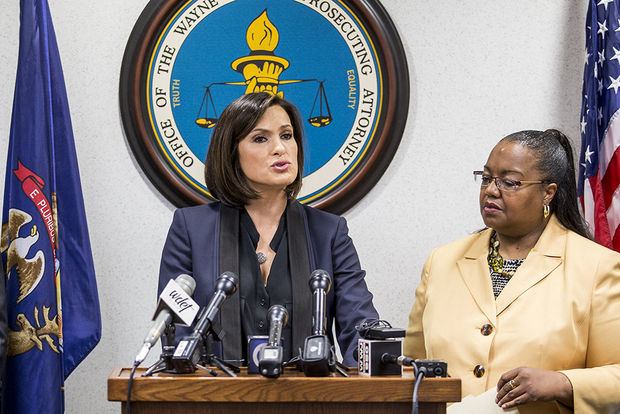You can leave this site quickly.
Learn more about Internet safety.
Joyful Heart in the News
Kym Worthy: Testing small portion of Detroit's 11,000-plus rape kit backlog identified 100 serial rapists
DETROIT, MI -- In 2009, Wayne County Prosecutor Kym Worthy learned that the Detroit Crime Lab had over 11,000 rape kits, some decades old, sitting idly in a warehouse.
Worthy, who says she was the victim of an unreported rape in college, has made testing these kits and serving justice a top priority. Worthy on Monday with Mariska Hargitay, the “Law & Order: Special Victims Unit" star who founded the Joyful Heart Foundation in 2004 to help battered women, victims of sexual assault and abused children, announced combined efforts to push Legislation through Lansing that would make tracking of rape kits mandatory and provide funding for the backlog problem.
The legislation intends to give victims greater input, defines a process for collection and submission by law enforcement and "establish boundaries" to removal for DNA from the national database.
"The ultimate goal is to identify and apprehend these offenders in a timely manner to stop serial rapists," a statement from Worthy's office says.
Worthy says there are numerous crimes, including rapes and killings, that would have likely been avoided had Detroit police and its now-defunct crime lab not let the kits languish.
 So far funding, all from grants or donations, has allowed for the testing of 1,600 kits. Of those, DNA identified 100 serial rapists, meaning the DNA appeared in at least two kits or were tied to suspects in other cases.
So far funding, all from grants or donations, has allowed for the testing of 1,600 kits. Of those, DNA identified 100 serial rapists, meaning the DNA appeared in at least two kits or were tied to suspects in other cases.
Fifty-nine percent of the DNA tested matched DNA submitted to the national database (CODIS, the Combined DNA Index System), leading to 14 prosecutions.
She's used the example of Shelly A. Brooks, who killed and raped five women after the date on one of those forgotten kits.
The small portion of tested kids revealed rapists that also committed crimes in 23 states, plus the District of Columbia.
The kits are being sent to private labs at a cost of $1,200 to $1,500 per kit, which equates to a total cost of more than $13.5 million to test all 11,303.
Worthy said the county is seeking grants and other funding options to complete the testing.
Although testing is time consuming and expensive, Worthy is adamant that they the work will continue.
"I don't care how long it takes, we're going to finish," she said Monday.
Sarah Tofte, who does work with the Joyful Hart Foundation, said the problem is a national once. In Memphis, she said, authorities came across 12,000 untested kits.
Department of Justice estimates there are about 400,000 untested kits nationwide,
Worthy said she was "really pissed off" when she learned about the law enforcement negligence that led to Detroit's backlog.
"But I had to let that go," she said. "I want to stay away from the blame game."
Members of the Prosecutor's office and state police discovered the 11,304 sexual assault kits while tour a Detroit police warehouse at 5140 Riopelle on Aug. 17, 2009.
She did take a shot at her political foe Wayne County Executive Robert Ficano, who's slashed Worthy's budget in recent years and left her, she says, without adequate staff to enact the justice Wayne County residents deserve.
"Violence in this county is a low priority," Worthy said of the budgeting decisions of "the CEO" -- she didn't name Ficano.
Worthy said there are currently 80 kits since 2009 that have accumulated and are awaiting testing.
When the evidence makes it to her office, there's not enough investigators to pursue charges and convictions swiftly, what Worthy called "a double slap in the face" to victims.
Hargitay said the forensic collection that is part of rape kit analysis can take up to six hours and when that process is completed and the kits just end up on a shelf, "it sends a message that you don't matter."
Through the efforts of Worthy's office, it received $1.5 million from the National Institute of Justice in April of 2011 to investigate the scope of the problem and devise a plan to address it.




Your Voices